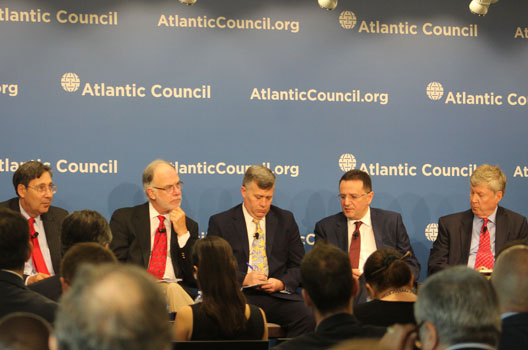 “The Black Sea is increasingly becoming a fault line between Russia and the US,” said Romanian ambassador to the US, George Christian Maior. Wednesday June 15, 2016, the Atlantic Council’s Dinu Patriciu Eurasia Center hosted a two-panel conference to discuss security and energy in the region. The first panel, The Changing Military Balance in the Black Sea, focused on the militarization of the Black Sea, and the reasons major Black Sea regional players have for pursuing policies which avoid escalating tensions.
“The Black Sea is increasingly becoming a fault line between Russia and the US,” said Romanian ambassador to the US, George Christian Maior. Wednesday June 15, 2016, the Atlantic Council’s Dinu Patriciu Eurasia Center hosted a two-panel conference to discuss security and energy in the region. The first panel, The Changing Military Balance in the Black Sea, focused on the militarization of the Black Sea, and the reasons major Black Sea regional players have for pursuing policies which avoid escalating tensions.
Relations between Russia and Turkey are at an all-time low, however, neither NATO nor Russia are interested in the same kind of build-up as is occurring in Eastern Europe and the Baltics. That being said, Russia’s Black Sea neighbors are acutely aware of the current Russian regime’s disregard for sovereignty, and the potential for an increased NATO presence was discussed by the panel at length. Russia is already overextended in Syria, Ukraine, and their matching of NATO forces in the Baltics. As Ambassador William Courtney pointed out, Russian correlation of forces is moving against Russia. Despite this overextension, the panelists agreed any increased NATO footprint in the Black Sea would elicit a response from Russia. The question is whether that response would be proportional. Watch below.
The second panel focused on energy and energy security in the Black Sea region. Edward Chow, Senior Fellow in the Energy and National Security Program at the Center for Strategic and International Studies, set the tone of the panel describing the Black Sea, and in particular, the energy sectors of Black Sea countries, as suffering “the burden of history”. Chow was referring to the legacy of the Soviet Union and the ways in which Soviet policies determined the major obstacles facing these industries today—obstacles ranging from infrastructure to institutionalized corruption.
Even as Black Sea nations seek to mitigate their dependence on Russian natural gas, the game of “pipeline poker,”—as David Koranyi, Director of the Atlantic Council’s Eurasian Energy Futures Initiative, termed Russia use of pipeline projects to influence geopolitics—continues to undermine diversification efforts in the region. The panel highlighted several policies which Black Sea nations could implement to begin reforming and reinvigorating their energy economies. Watch below.
